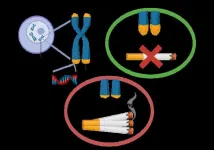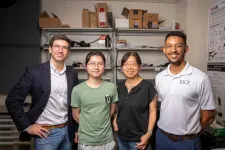(Press-News.org) Milan, Italy: A study of nearly 500,000 people has shown that smoking shortens the end fragments of chromosomes in the white blood cells of our immune systems. The length of these end fragments, called telomeres, is an indicator of how quickly we age and our cells’ ability to repair and regenerate.
In her presentation to the European Respiratory Society International Congress in Milan, Italy [1], Dr Siyu Dai, who is an assistant professor in the School of Clinical Medicine, Hangzhou Normal University, and also an honorary postdoctoral researcher in the department of paediatrics, The Chinese University of Hong Kong, said: “Our study shows that smoking status and cigarette quantity can result in the shortening of leucocyte telomere length, which is an indicator of tissue self-repair, regeneration and ageing. In other words, smoking can accelerate the process of ageing, while quitting may considerably decrease the related risk.”
Telomeres are like the plastic or metal sheathes at the end of shoelaces, which prevent the shoelaces from fraying. They are lengths of repetitive DNA sequences that protect the ends of chromosomes. Each time a cell divides, the telomeres become slightly shorter, eventually becoming so short that the cell can no longer divide successfully, and it dies. This is part of the ageing process. Telomere length in white blood cells (called leucocytes) has been linked previously to smoking, but, until now, there has been little research into whether smoking status and the quantity of cigarettes smoked actually caused the shortening in telomere length.
Dr Dai and her colleague Dr Feng Chen, from The Chinese University of Hong Kong, analysed data from UK Biobank, which contain genetic and health information from half a million UK participants. They looked at whether a person was a current smoker, previous smoker or had never smoked, level of addiction to smoking, how many cigarettes they smoked (the pack years of cigarette consumption), as well as information on leucocyte telomere length taken from blood tests.
They used a method called Mendelian randomisation, which uses the variations in genes (known as single nucleotide polymorphisms or SNPs) that are inherited from our parents, to infer how exposure to a modifiable environmental factor (such as smoking) is causally related to a disease or health condition (such as shorter leucocyte telomeres). Mendelian randomisation avoids the problem of other, often unknown factors affecting the results, thereby enabling researchers to investigate whether a particular factor is the cause of a condition, rather than just being associated with it.
The researchers used data from 472,174 UK Biobank participants, and 113 SNPs relating to smoking status (15 SNPs for current smokers, 78 SNPs for never smokers, and 20 SNPs for people who had smoked previously).
“We found that current smoking status was statistically significantly associated with shorter leucocyte telomere length, whereas previous smokers and people who had never smoked didn’t show significantly shorter leucocyte telomere length. Among people who used to smoke, there was a trend towards shorter telomere length, but this was not statistically significant. People who smoked the greater number of cigarettes had significantly shorter leucocyte telomere length. In summary, smoking may cause the shortening of leucocyte telomere length, and the more cigarettes smoked, the stronger the shortening effect,” said Dr Dai.
“In recent years, observational studies have linked shortened leucocyte telomere length with many diseases, such as cardiovascular disease, diabetes and muscle loss. This means that the effect of smoking on telomere length probably plays a critical role in these diseases, although more research is needed to understand the underlying mechanisms.
“Our study adds to the evidence that smoking causes ageing. As there are clear health benefits of smoking cessation, it is time to include cessation support as well as treatment into daily clinical management to help us to create a smoke-free environment for the next generation.”
Dr Dai and Dr Chen will carry out further research to validate the current findings. They are also interested in exploring further the effect of passive smoke exposure on tissue self-repair, regeneration and ageing, particular in the way that it could affect children.
Professor Jonathan Grigg, Chair of the European Respiratory Society Tobacco Control Committee, was not involved with this research. He commented: “This study addresses the question whether smoking affects telomere lengths. Telomeres protect the ends of chromosomes. If telomeres become short, cells can no longer divide successfully, and they die. Dr Dai and her colleagues, in a study of half a million adults, show a clear association between smoking and reduced telomere length. This study applied Mendelian randomisation, a well-known method for providing good levels of evidence and being able to show causal relationships, to support previous, observational studies suggesting that smoking causes ageing, while quitting may reverse this effect. It will be interesting to see what the researchers have found in relation to the effects of passive smoking on telomere length.”
(ends)
[1] Abstract no: OA4230. “The causal relationship between smoking conditions and telomere length: a mendelian randomization study in UK biobank”, by Dr Siyu Dai et al; Presented in session, “Selected Tobacco and Nicotine Research” at 09.30-10.45 hrs CEST on Tuesday 12 September 2023. https://k4.ersnet.org/prod/v2/Front/Program/Session?e=379&session=16433
END
Genetic evidence shows that smoking can cause us to age faster
2023-09-12
ELSE PRESS RELEASES FROM THIS DATE:
Alive without a pulse: Evolution of durable left ventricular assist devices
2023-09-11
https://www.scienceopen.com/hosted-document?doi=10.15212/CVIA.2023.0056
Announcing a new article publication for Cardiovascular Innovations and Applications journal. Durable left ventricular assist devices (LVADs) offer a viable option for patients with advanced heart failure and have been demonstrated to be superior to optimal medical therapy in terms of both mortality and quality of life, in selected patients. However, durable LVADs can be associated with severe morbidity. Because the rates of cardiac ...
Doctoral student’s "fear of positivity" research could assist with effective depression treatments
2023-09-11
STARKVILLE, Miss.—How can positive experiences seem like the opposite for some?
A doctoral student in Mississippi State University’s Clinical Psychology program believes this phenomenon is true, and his recent research is featured in an upcoming issue of The Journal of Behavioral Therapy and Experimental Psychiatry.
Michael R. Gallagher’s article “A network analytic investigation of avoidance, dampening, and devaluation of positivity” focuses on how behaviors related to processing positive experiences may play a role ...
Stem cell-derived components may treat underlying causes of PCOS
2023-09-11
Polycystic ovary syndrome (PCOS) is a pervasive endocrine disorder that affects millions of women globally, impacting their hormonal balance, fertility and overall well-being. It is notoriously difficult to treat, with widely varying symptoms and mysterious, complex underlying causes. Researchers at the University of Chicago recently unveiled a potential new PCOS treatment that may improve multiple PCOS symptoms by regulating body systems and reducing inflammation.
Recently published results demonstrate the promise ...
Urban parks built on former waste incineration sites could be lead hotspots
2023-09-11
DURHAM, N.C. – For much of the last century, many cities across the United States and Canada burned their trash and waste in municipal incinerators. Most of these facilities were closed by the early 1970s due to concerns about the pollution they added to the air, but a new Duke University study finds that their legacy of contamination could live on in urban soils.
“We found that city parks and playgrounds built on the site of a former waste incinerator can still have greatly elevated levels of lead in their surface soils many decades after the incinerator was closed,” ...
You can leave your gloves on: Rice-developed material burns viruses, safe for skin
2023-09-11
HOUSTON – (Sept. 11, 2023) A new material that packs deadly heat for viruses on its outer surface while staying cool on the reverse side could transform the way we make and use personal protective equipment (PPE), cutting down the pollution and carbon footprint associated with current materials and practices.
The composite, textile-based material developed by Rice University engineers uses Joule heating to decontaminate its surface of coronaviruses like SARS-CoV-2 in under 5 seconds, effectively killing at least 99.9% of viruses. Wearable items made from the material can handle hundreds of uses with the potential for a single pair of gloves to prevent nearly ...
Not too big: Machine learning tames huge data sets
2023-09-11
LOS ALAMOS, N.M., Sept. 11, 2023 — A machine-learning algorithm demonstrated the capability to process data that exceeds a computer’s available memory by identifying a massive data set’s key features and dividing them into manageable batches that don’t choke computer hardware. Developed at Los Alamos National Laboratory, the algorithm set a world record for factorizing huge data sets during a test run on Oak Ridge National Laboratory’s Summit, the world’s fifth-fastest supercomputer.
Equally efficient on laptops and supercomputers, ...
UArizona Cancer Center researchers discover iron-targeting approaches to halt proliferation of cancer cells
2023-09-11
Researchers at the University of Arizona Cancer Center discovered a new class of iron-targeting compounds that hamper the proliferation of cultured malignant cells in a laboratory setting. The results of the study were published in the Journal of the American Chemical Society.
“Cancer cells are what we call ‘addicted’ to iron, and so we are making compounds that are able to interfere with the availability of iron in cancer cells,” said Elisa Tomat, PhD, professor in the Department of Chemistry ...
Experimental physicist David Weld to investigate the role of feedback and measurement in quantum systems
2023-09-11
(Santa Barbara, Calif.) — Experimental physicist David Weld’s experimental research interest lies in a question that has been around for a long time, but which we’re only now approaching the ability to investigate.
“There’s a really old interest in the quantum act of measurement,” he said. “It’s something that’s at the foundations of quantum mechanics and has been puzzling people for more than a century.”
Called the “measurement problem” and famously illustrated by Erwin Schrödinger’s ...
ORNL teams receive funding through DOE BRaVE initiative to study biopreparedness
2023-09-11
The Department of Energy’s Office of Science has selected three Oak Ridge National Laboratory research teams to receive funding through DOE’s new Biopreparedness Research Virtual Environment, or BRaVE, initiative.
BRaVE, announced earlier this year, aims to build on biopreparedness research that delivered high-impact results in the fight against COVID-19. In the height of the pandemic, DOE national laboratory scientists combined fields such as biology, high-performance computing and manufacturing to bolster the national supply of personal protective equipment and improve virus testing and treatment.
“The advances made ...
Self-reported “night owls” more likely to have unhealthy lifestyle behaviors, significantly increased diabetes risk
2023-09-11
Embargoed for release until 5:00 p.m. ET on Monday 11 September 2023
Annals of Internal Medicine Tip Sheet
@Annalsofim
Below please find summaries of new articles that will be published in the next issue of Annals of Internal Medicine. The summaries are not intended to substitute for the full articles as a source of information. This information is under strict embargo and by taking it into possession, media representatives are committing to the terms of the embargo not only on their own behalf, but also on behalf of the organization they represent.
----------------------------
1. Self-reported “night owls” more likely to have ...






